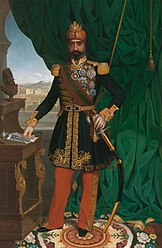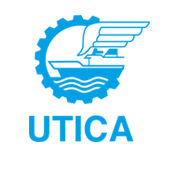
Tunisia, officially the Republic of Tunisia, is a country in the Maghreb region of North Africa, covering 163,610 square kilometres. Its northernmost point, Cape Angela, is also the northernmost point on the African continent. Tunisia is bordered by Algeria to the west and southwest, Libya to the southeast, and the Mediterranean Sea to the north and east. Tunisia's population was 11.5 million in 2017. Tunisia's name is derived from its capital city, Tunis, which is located on its northeast coast.

Tunisian culture is a product of more than three thousand years of history and an important multi-ethnic influx. Ancient Tunisia was a major civilization crossing through history; different cultures, civilizations and multiple successive dynasties contributed to the culture of the country over centuries with a varying degrees of influence. Among these cultures were the Carthaginian – their native civilization, Roman, Vandal, Jewish, Christian, Arab, Islamic, Turkish, and French, in addition to native Amazigh. This unique mixture of cultures made Tunisia, with its strategic geographical location in the Mediterranean, the core of some great civilizations of Mare Nostrum.

Muhammad III as-Sadiq GCB was the Husainid Bey of Tunis from 1859 until his death. Invested as Bey al-Mahalla on 10 June 1855, he succeeded his brother Muhammad II ibn al-Husayn on 23 September 1859. Named as divisional General in the Imperial Ottoman Army on 10 June 1855, he was promoted to the rank of Marshal on 10 December 1859.

Muhammad VIII al-Amin known as Lamine Bey, was the last Bey of Tunis, and also the only King of Tunisia.

The Bourse des Valeurs Mobilières de Tunis (BVMT) or Bourse de Tunis is a stock exchange based in Tunis, Tunisia. It was founded in 1969, and currently lists around 50 stocks.

Ahmed I, born 2 December 1805 in Tunis died May 1855 at La Goulette, was the tenth Husainid Bey of Tunis, ruling from 1837 until his death. He was responsible for the abolition of slavery in Tunisia in 1846.
The Établissement de la Radiodiffusion-Télévision Tunisienne (ERTT) – Tunisian Radio and Television Establishment – is Tunisia's state broadcasting organization. It operates two television channels and several radio networks. It is a shareholder in Euronews, a member of the European Broadcasting Union and the African Union of Broadcasting, and the flagship member of the Arab States Broadcasting Union.
Abdelaziz Gorgi was a Tunisian artist. He was one of the founders of the Tunis School of painting and one of the most prominent members of Tunisia's cultural scene.

La Presse, founded in 1934, is a large-circulation French-language daily newspaper published in Tunis, Tunisia.

Mohamed Moncef Marzouki is a Tunisian politician who was President of Tunisia from 2011 to 2014. Through his career he has been a human rights activist, physician and politician. On 12 December 2011, he was elected as President of Tunisia by the Constituent Assembly.

Ridha Saidi is a Tunisian politician. He serves as the Minister of Economy under Prime Minister Hamadi Jebali.

The Wafa Movement, sometimes referred to as the Independent Democratic Congress, is a political party in Tunisia.

Mezri Haddad is a Tunisian journalist, writer, philosopher and diplomat. Haddad was a doctor of moral and political philosophy at the Paris-Sorbonne University, and the first Muslim candidate to be qualified by the National Council of French universities as a lecturer in Catholic theology. He is the author of several essays that focus on politics and religion.

Tunisian Union of Industry, Trade and Handicrafts or UTICA is an employers' organization in Tunisia representing industrial, trade and craft sectors. On October 9, 2015, the National Dialogue Quartet, comprising UTICA, the Tunisian General Labour Union, the Tunisian Human Rights League and the Tunisian Order of Lawyers, was announced as the laureate of the 2015 Nobel Peace Prize "for its decisive contribution to the building of a pluralistic democracy in Tunisia in the wake of the Jasmine Revolution of 2011".

The 1987 Tunisian coup d'état involved the bloodless ousting of the ageing President of Tunisia Habib Bourguiba on 7 November 1987, and his replacement as President by his recently appointed Prime Minister, Zine El Abidine Ben Ali. The action was justified by reference to Bourguiba's failing health and Article 57 of the country's constitution. Reports later surfaced to indicate that the Italian intelligence services had been involved in planning it.
Music in Tunisian Arabic has appeared in the 17th century. It has developed a lot since the 19th century and has spread all over Tunisia mainly after the creation of Radio Tunis and Établissement de la radiodiffusion-télévision tunisienne. Nowadays, Tunisian Arabic has become the main language of songs in Tunisia including Tunisian music, Underground music and Opera.
Mohamed Gueddiche is a Tunisian cardiologist. He also holds a senior military rank. His significance nationally has been based in part on his position as the personal physician to President Ben Ali, and as a physician for Ben Ali's predecessor.
Mohamed Zouari, was born in 1967 and assassinated on December 15, 2016 in Sfax when he was shot dead in a drive-by shooting operation generally attributed to Mossad. Zouari was a Tunisian Aerospace engineer working for Hamas military wing The Izz ad-Din al-Qassam Brigades.
Nada Mezni Hafaiedh is a Tunisian film director. Born in 1984 in Saudi Arabia, she was from an early aged exposed to different cultures due to her diplomatic parents. Saudi Arabia, USA, France, Canada represents a pool of developments of her passion for cinema.














